De Russische dichter en schrijver Michail Joerjevitsj Lermontov werd geboren op 15 oktober 1814 in Moskou. Zie ook mijn blog van 15 oktober 2010 en eveneens alle tags voor Michail Lermontov op dit blog.
The Dream
In noon’s heat, in a dale of Dagestan
With lead inside my breast, stirless I lay;
The deep wound still smoked on; my blood
Kept trickling drop by drop away.
On the dale’s sand alone I lay. The cliffs
Crowded around in ledges steep,
And the sun scorched their tawny tops
And scorched me – but I slept death’s sleep.
And in a dream I saw an evening feast
That in my native land with bright lights shone;
Among young women crowned with flowers,
A merry talk concerning me went on.
But in the merry talk not joining,
One of them sat there lost in thought,
And in a melancholy dream
Her young soul was immersed – God knows by what.
And of a dale in Dagestan she dreamt;
In that dale lay the corpse of one she knew;
Within his breast a smoking wound showed black,
And blood ran in a stream that colder grew.
Heaven And The Stars
Brilliant heavens of evening,
Distant stars clearly shining,
Bright as the rapture of childhood,
O why dare I send you nevermore greeting–
Stars, who are shining as clear as my joy?
What is thy sorrow?
Mortals make question.
This is my sorrow;
The heavens and the stars are–heaven and stars ever,
I am alas! but a perishing man!
Forever mortal
Envies his neighbor;
I envy rather
Ye in your freedom, ye stars ever radiant,
And only would be in your places!
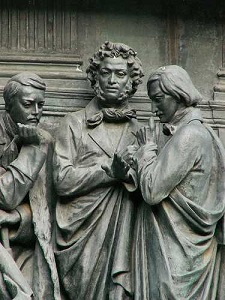
Michail Lermontov (15 oktober 1814 – 27 juli 1841)
Lermontov, Poesjkin en Gogol op het Nationale Monument in het Kremlin van Novgorod
De Italiaanse schrijver Italo Calvino werd geboren in Santiago de las Vegas op Cuba op 15 oktober 1923. Zie ook mijn blog van 15 oktober 2010 en eveneens alle tags voor Italo Calvino op dit blog.
Uit: If on a winter’s night a traveller (Vertaald door William Weaver)
« You are about to begin reading Italo Calvino’s new novel, If on a winter’s night a traveler. Relax. Concentrate. Dispel every other thought. Let the world around you fade. Best to close the door; the TV is always on in the next room. Tell the others right away, “No, I don’t want to watch TV!” Raise your voice–they won’t hear you otherwise–“I’m reading! I don’t want to be disturbed!” Maybe they haven’t heard you, with all that racket; speak louder, yell: “I’m beginning to read Italo Calvino’s new novel!” Or if you prefer, don’t say anything;just hope they’ll leave you alone.
Find the most comfortable position: seated, stretched out, curled up, or lying flat. Flat on your back, on your side, on your stomach. In an easy chair, on the sofa, in the rocker, the deck chair, on the hassock. In the hammock, if you have a hammock. On top of your bed, of course, or in the bed. You can even stand on your hands, head down, in the yoga position. With the book upside down, naturally.
Of course, the ideal position for reading is something you can never find. In the old days they used to read standing up, at a lectern. People were accustomed to standing on their feet, without moving. They rested like that when they were tired of horseback riding. Nobody ever thought of reading on horseback; and yet now, the idea of sitting in the saddle, the book propped against the horse’s mane, or maybe tied to the horse’s ear with a special harness, seems attractive to you. With your feet in the stirrups, you should feel quite comfortable for reading; having your feet up is the first condition for enjoying a read.
Well, what are you waiting for? Stretch your legs, go ahead and put your feet on a cushion. on two cushions, on the arms of the sofa, on the wings of the chair, on the coffee table, on the desk, on the piano, on the globe. Take your shoes off first. If you want to , put your feet up; if not, put them back. Now don’t stand there with your shoes in one hand and the book in the other.
Adjust the light so you won’t strain your eyes. Do it now, because once you’re absorbed in reading there will b no budging you. Make sure the page isn’t in shadow, a clotting of black letters on a gray background, uniform as a pack of mice; but be careful that the light cast on it isn’t too strong, doesn’t glare on the cruel white of the paper, gnawing at the shadows of the letters as in a southern noonday. Try to foresee now everything that might make you interrupt your reading. Cigarettes within reach, if you smoke, and the ashtray. Anything else? Do you have to pee? All right, you know best.”
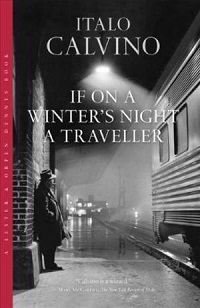
Italo Calvino (15 oktober 1923 – 19 november 1985)
Cover
De Nederlandse schrijfster Tessa de Loo (pseudoniem van Tineke Duyvené de Wit) werd op 15 oktober 1946 in Bussum geboren. Zie ook mijn blog van 15 oktober 2010 en eveneens alle tags voor Tessa de Loo op dit blog.
Uit: The Twins (Vertaald door Ruth Levitt)
“All of a sudden she could not bear the heat anymore. She heaved herself up laboriously until she was standing shakily in the metal bathtub, her body covered in a film of liquid chocolate that evened out all irregularities. As though I were already dead and buried, she thought. When she realized that her state would give the woman who was coming to rinse her down a foolish, alarming impression, she sagged slowly at the knees, back into the sludge, holding tightly onto the edge of the bath with both hands. The song stopped at that very moment, as abruptly as it had started, as though it were no more than the flicker of a memory presumed lost.
The German could not tolerate being in bed for long. After a few minutes she shuffled across the worn parquet floor again, towards a table with two bottles of mineral water beside a stack of plastic beakers. Lotte followed her actions intently, despite herself, as though she had to keep on her guard.
`Excusez moi, madame …’ With a slight inflection, in ponderous school French, the woman turned unexpectedly to Lotte. `C’est permis … for us … to drink this water?’
The story that follows probably would not have happened if Lotte had also replied in French. But on a reckless impulse she said, `Yes, das Wasser können Sie trinken.’
`Ach so!’ The woman forgot the water, retraced her steps to Lotte’s bed, exclaiming delightedly, `You’re German!’
`No, yes, no …’ Lotte stammered. But she had already lit the fuse; crackling softly, the woman was coming towards her. Everything about her was broad, round and curved, an elderly Walküre who would not go away. She stood at the foot of Lotte’s bed, casting a shadow over it. She looked candidly at her, `Where are you from, if I might ask?’ Lotte tried to retract her impulsiveness, `From Holland.’ `But your German is faultless!’ the woman insisted, spreading her plump hands. `From Cologne originally,’ Lotte conceded, in the flat tone of a forced admission. `Cologne! But that’s where I’m from too!’
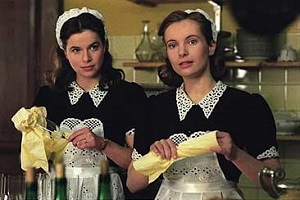
Tessa de Loo (Bussum, 15 oktober 1946)
Scene uit de film “De tweeling” uit 1993
De Brits-Amerikaanse schrijver Grenville Wodehouse werd geboren op 15 oktober 1881 in Guildford. Zie ook mijn blog van 15 oktober 2010 en eveneens alle tags voorP.G. Wodehouse op dit blog.
Uit: Leave It To Jeeves
“He shook his head.
“I’d rather not, sir.”
“But it’s the straight goods. I’m going to put my shirt on him.”
“I do not recommend it, sir. The animal is not intended to win. Second place is what the stable is after.”
Perfect piffle, I thought, of course. How the deuce could Jeeves know anything about it? Still, you know what happened. Wonderchild led till he was breathing on the wire, and then Banana Fritter came along and nosed him out. I went straight home and rang for Jeeves.
“After this,” I said, “not another step for me without your advice. From now on consider yourself the brains of the establishment.”
“Very good, sir. I shall endeavour to give satisfaction.”
And he has, by Jove! I’m a bit short on brain myself; the old bean would appear to have been constructed more for ornament than for use, don’t you know; but give me five minutes to talk the thing over with Jeeves, and I’m game to advise any one about anything. And that’s why, when Bruce Corcoran came to me with his troubles, my first act was to ring the bell and put it up to the lad with the bulging forehead.
“Leave it to Jeeves,” I said.
I first got to know Corky when I came to New York. He was a pal of my cousin Gussie, who was in with a lot of people down Washington Square way. I don’t know if I ever told you about it, but the reason why I left England was because I was sent over by my Aunt Agatha to try to stop young Gussie marrying a girl on the vaudeville stage, and I got the whole thing so mixed up that I decided that it would be a sound scheme for me to stop on in America for a bit instead of going back and having long cosy chats about the thing with aunt. So I sent Jeeves out to find a decent apartment, and settled down for a bit of exile. I’m bound to say that New York’s a topping place to be exiled in. Everybody was awfully good to me, and there seemed to be plenty of things going on, and I’m a wealthy bird, so everything was fine. Chappies introduced me to other chappies, and so on and so forth, and it wasn’t long before I knew squads of the right sort, some who rolled in dollars in houses up by the Park, and others who lived with the gas turned down mostly around Washington Square–artists and writers and so forth. Brainy coves.”
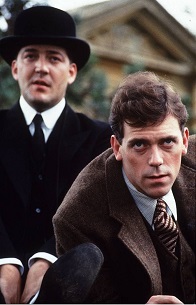
P.G. Wodehouse (15 oktober 1881 – 14 februari 1975)
Stephen Fry (Jeeves) en Hugh Laurie (Wooster) in de Britse komische televisieserie “Jeeves and Wooster” (1990 – 1993)
De Amerikaanse schrijver Mario Puzo werd geboren in New York op 15 oktober 1920. Zie ook alle tags voor Mario Puzo op dit blog en ook mijn blog van 15 oktober 2009 en ook mijn blog van 15 oktober 2010.
Uit: The Godfather
“The three of them sat at the only round table, Sollozzo refusing a booth. There were only two other people in the restaurant. Michael wondered whether they were Sollozzo plants. But it didn’t matter. Before they could interfere it would be all over.
McCluskey asked with real interest, “Is the Italian food good here?”
Sollozzo reassured him. “Try the veal, it’s the finest in New York.” The solitary waiter had brought a bottle of wine to the table and uncorked it. He poured three glasses full. Surprisingly McCluskey did not drink. “I must be the only Irishman who don’t take the booze,” he said. “I seen too many good people get in trouble because of the booze.”
Sollozzo said placatingly to the captain, “I am going to talk Italian to Mike, not because I don’t trust you but because I can’t explain myself properly in English and I want to convince Mike that I mean well, that it’s to everybody’s advantage for us to come to an agreement tonight. Don’t be insulted by this, it’s not that I don’t trust you.”
Captain McCluskey gave them both an ironic grin. “Sure, you two go right ahead,” he said. “I’ll concentrate on my veal and spaghetti.”
Sollozzo began speaking to Michael in rapid Sicilian. He said, “You must understand that what happened between me and your father was strictly a business matter.” I have a great respect for Don Corleone and would beg for the opportunity to enter his service. But you must understand that your father is an old-fashioned man. He stands in the way of progress. The business I am in is the coming thing, the wave of the future, there are untold millions of dollars for everyone to make. But your father stands in the way because of certain unrealistic scruples. »
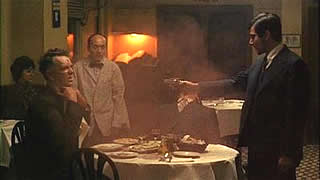
Mario Puzo (15 oktober 1920 – 2 juli 1999)
Scene uit de gelijknamige film uit 1972
De biografische data zijn onzeker en berusten op verhalen en legenden, maar de internationale internet encyclopedie Wikipedia geeft 15 oktober 70 v. Chr. als geboortedatum van Publius Vergilius Maro. Zie ook mijn blog van 15 oktober 2010 en eveneens alle tags voor Vergilius op dit blog.
Uit: Aeneis IV (Vertaald door Ben Bijnsdorp)
– Intussen begint de lucht onder luid gerommel te betrekken,
er volgt een stortbui, met hagel gemengd,
en de Tyrische vrienden, de manschap uit Troje en ook
de Dardaanse kleinzoon van Venus gaan angstig op zoek naar een schuilplaats,
waar ook te vinden in het gebied,van de bergen kolken reeds stromen neer.
Dido en de Trojaanse leider komen terecht in dezelfde grot.
Eerst geven Tellus en Iuno, godin van het huwelijk
een teken: bliksems flikkeren, ook de aether, getuige bij het verbond,
en op de bergtop juichen de nimfen.
Die dag was de eerste van de dood en de eerste aanzet tot een serie ellende,
want niets meer trekt Dido zich aan van fatsoen of reputatie
en zij denkt ook niet meer aan liefde in het geheim:
zij noemt het een huwelijk, met deze aanduiding camoufleert zij haar schuld.
– Meteen trekt Fama door de grote steden van Libië,
Fama, het snelste kwaad dat bestaat:
sterk door haar snelheid wint ze onderweg nog aan impact,
eerst nog klein door haar schuchterheid, verheft ze zich daarna hemelhoog
en loopt op de grond met haar kop verstopt in de wolken.
Moeder aarde bracht haar voort, ontstoken in woede op de goden,
haar laatste, zoals verluidt, een zus voor Coeus en Enceladus,
rap ter been en met verderfbrengende vleugels,
een griezelig monster, reusachtig; zoveel veren als ze aan haar lichaam heeft
zoveel waakzame oogjes zitten daaronder (wonderlijk om het te beschrijven),
en evenveel tongen, ze kletst met evenveel monden, spitst evenveel oren.
’s Nachts vliegt zij door het donker tussen hemel en aarde
met gesuis, maar nooit sluit zij haar ogen voor een zoete slaap;
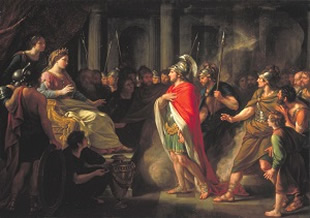
Vergilius (15 oktober 70 v. Chr. – 21 september 19 voor Chr.)
De ontmoeting van Dido en Aeneas door Nathaniel Dance-Holland, 1766
Onafhankelijk van geboortedata:
De Nederlandse schrijver Kees Beekmans werd geboren in 1961. Zie ook alle tags voor Kees Beekmans op dit blog en ook mijn blog van 15 oktober 2010.
Uit: Eén hand kan niet klapt (Senad)
“De theaterles, één uur per week gedurende de basiscursus Nederlands, was het uur van Senad – het enige waarin hij ongestraft zichzelf kon zijn. Waar de meeste leerlingen tijdens de eerste les braaf de bewegingen van een voetballer of een zwemmer nabootsten, daar ging Senad slechts ietwat door de knieën toen het zýjn beurt was een geliefd tijdverdrijf uit te beelden. In die houding keek hij de rest van de klas afwachtend aan.
Niemand raadde, of dorst te raden, wat dat voor hobby was. ‘Nou Senad, Senad was het toch hè,’ zei theaterdocente Patchouli, ‘wat is dat, wat doe jij graag?’
‘Poepen,’ riep Senad. Een en ander veroorzaakte hilariteit – en toch, toch kwam het op mij niet banaal over. Natuurlijk, Senad had willen provoceren, maar dan alleen door een gewoonlijk verzwegen waarheid nu eens uit te spreken.
De zeventienjarige Senad, alleen in naam moslim, was afkomstig van en gevlucht uit Bijeljina, een kleine, overwegend Servische stad in het noordoosten van Bosnië. Hij ging, met zijn Levi’s 501 en houthakkershemd, westers gekleed. Met zijn lange zwarte haar, dat hem als een half gesloten gordijn voor de ogen hing, met zijn passie voor muziek en bovenal met zijn dat-niet-zo-belangrijk-houding waar het schoolse zaken betrof, vertegenwoordigde hij het type van de hippie.
In de derde week, de derde theaterles, speelde de 26-jarige Patchouli zelf mee, ze speelde een liftster. Gestrand ergens op het platteland, azend op een ritje naar de grote stad, sprak ze Senad aan, die op zijn stoel in de kring zat. ‘Oo´o´o´o´o´o´ mene´e´e´e´e´r! Wat een mooie auto heeft u! En ik hoor dat u naar de stad gaat… Mag ik niet met u meerijden?’
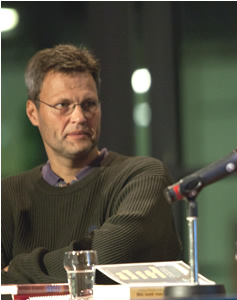
Kees Beekmans (1961)
